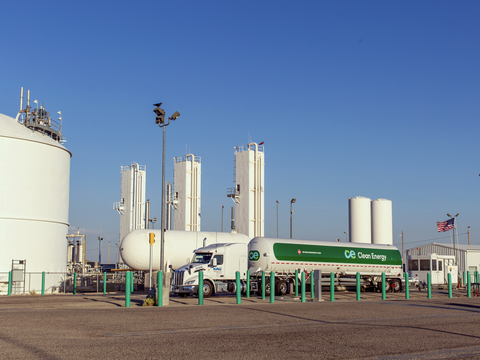Clean Energy Expands Boron LNG Plant Capacity to Accommodate Increased Demand for Cleaner Fuel Driven by Pasha Hawaii Container Ships

Clean Energy Boron LNG Plant's 3 Production Trains (Photo: Business Wire)
An important Clean Energy customer, Pasha Hawaii, is now operating three LNG-powered container ships out of the Ports of
Not only can fueling with LNG significantly and immediately improve air quality around the ports, which often have some of the worst air pollution in the country, but by operating on LNG, all three Pasha Hawaii ships surpass the International Maritime Organizations (IMO) 2030 standards for ocean vessels with zero sulfur emissions. Pasha’s LNG ships also obtain a 90 percent reduction in nitrogen oxide and 25 percent reduction in carbon dioxide compared to ships running on traditional fuels.
“Pasha Hawaii’s leadership in sustainable shipping has grown with the commissioning of their third LNG-powered ship. By growing their LNG-fleet, they are reducing pollution and carbon emissions around the ports and showing that LNG can work as effectively as their fuel oil counterpart. The addition of more LNG production at our
“We are dedicated to employing today’s most innovative resources and technologies to ensure the cleanest operations possible in the communities we serve,” said George Pasha, IV, President and CEO, The Pasha Group. “We are proud to continue our partnership with Clean Energy to efficiently bunker and fuel our three LNG-powered container ships in the Pasha Hawaii fleet, which are among the most technologically advanced and environmentally friendly vessels to serve
About Clean Energy
Clean Energy Fuels Corp. is the country’s largest provider of the cleanest fuel for the transportation market. Our mission is to decarbonize transportation through the development and delivery of renewable natural gas (RNG), a sustainable fuel derived by capturing methane from organic waste. Clean Energy allows thousands of vehicles, from airport shuttles to city buses to waste and heavy-duty trucks, to reduce their amount of climate-harming greenhouse gas. We operate a vast network of fueling stations across the
Forward-Looking Statements
This news release contains forward-looking statements within the meaning of Section 27A of the Securities Act of 1933 and Section 21E of the Securities Exchange Act of 1934 that involve risks, uncertainties and assumptions, including without limitation statements about: the amounts and timing of natural gas expected to be produced or consumed; the timing and scope of construction, maintenance, and other projects; the characteristics and performance of natural gas engines and fuels; the environmental and other benefits of Clean Energy’s fuels; the availability of environmental, tax and other government regulations, programs and incentives; and the impacts of legislative and regulatory developments. Actual results and the timing of events could differ materially from those anticipated in these forward-looking statements. The forward-looking statements made herein speak only as of the date of this press release and, unless otherwise required by law, Clean Energy undertakes no obligation to publicly update such forward-looking statements to reflect subsequent events or circumstances. Additionally, the reports and other documents Clean Energy files with the SEC (available at www.sec.gov) contain risk factors, which may cause actual results to differ materially from the forward-looking statements contained in this news release.
View source version on businesswire.com: https://www.businesswire.com/news/home/20240611588001/en/
Media Contact:
Kimberly Fleer
1-949-437-1447
Kimberly.Fleer@cleanenergyfuels.com
Investor Contact:
Thomas Driscoll
1-949-437-1191
Thomas.Driscoll@cleanenergyfuels.com
Source: Clean Energy Fuels Corp.







